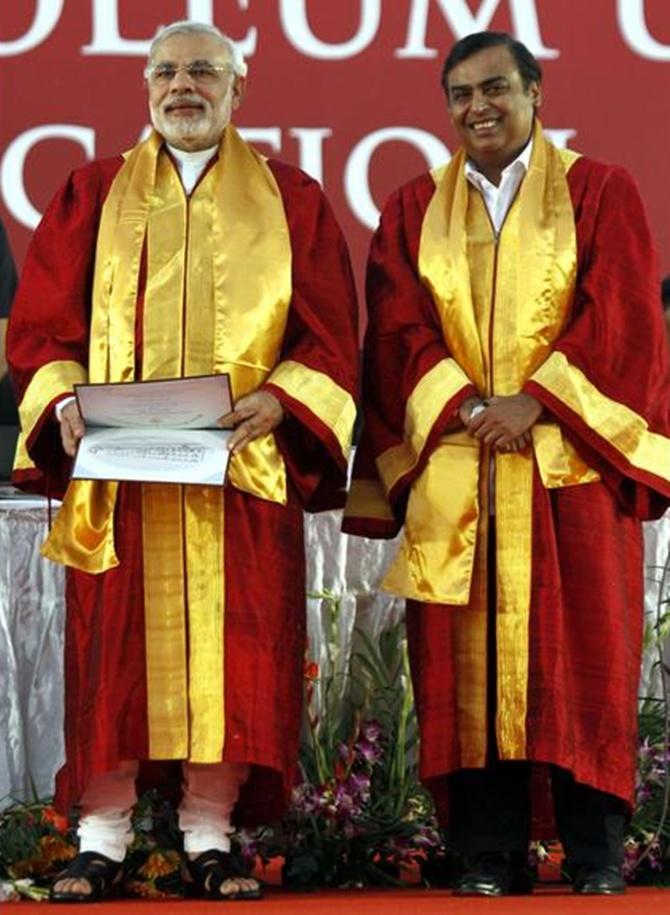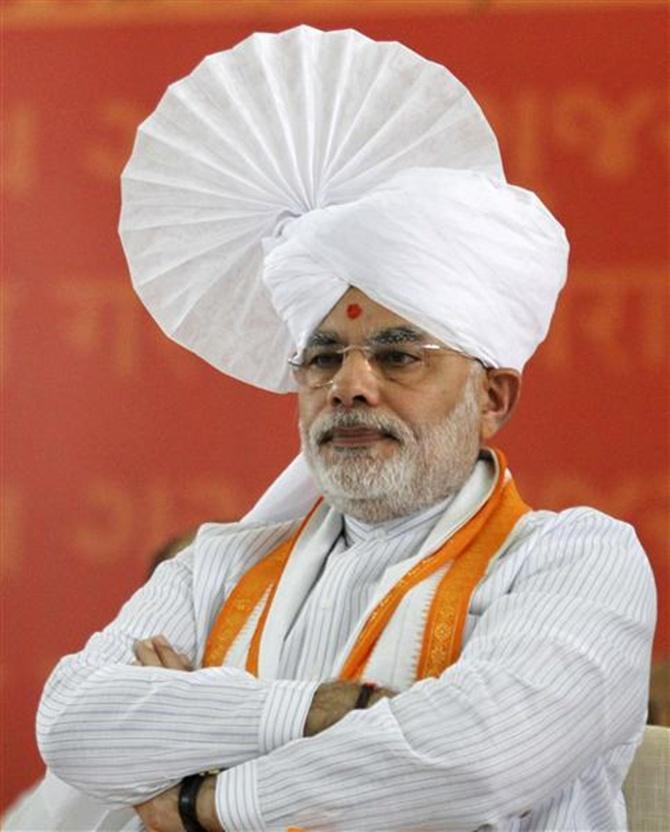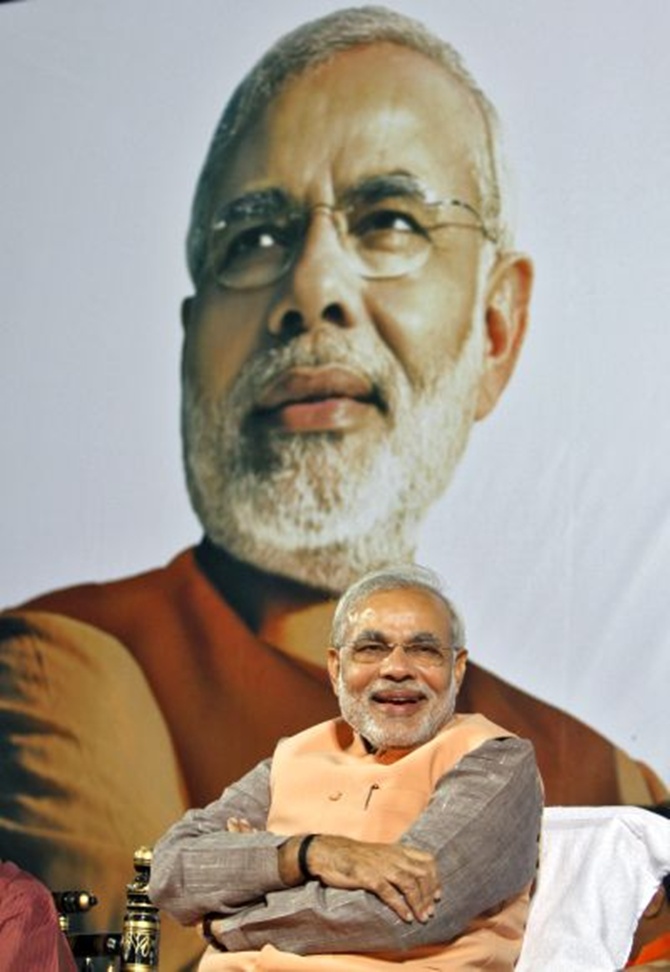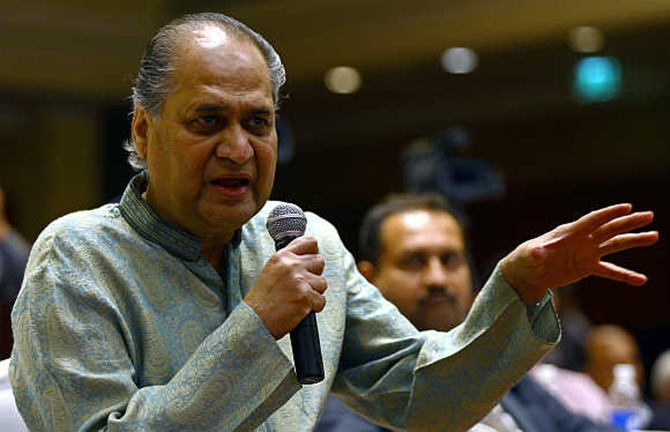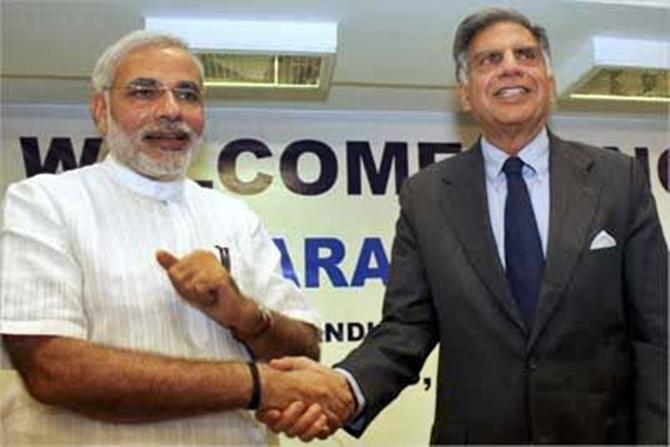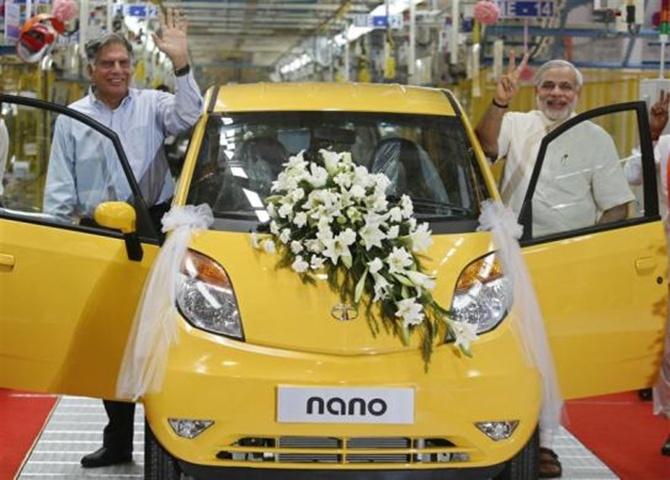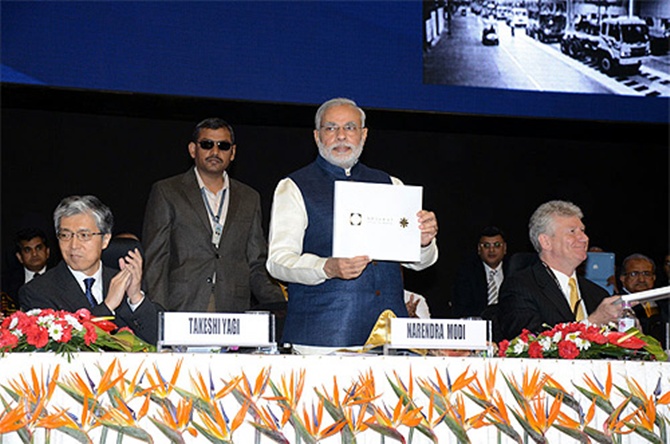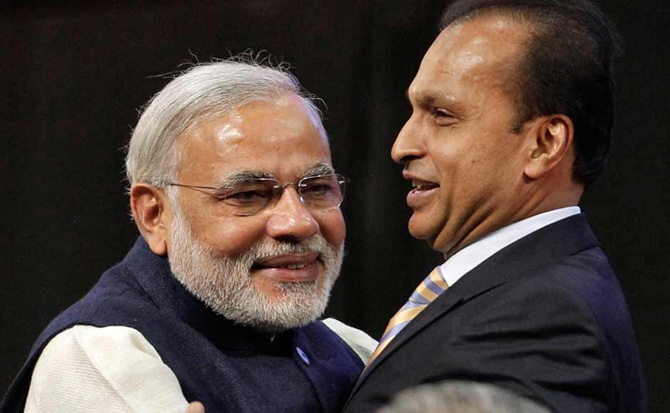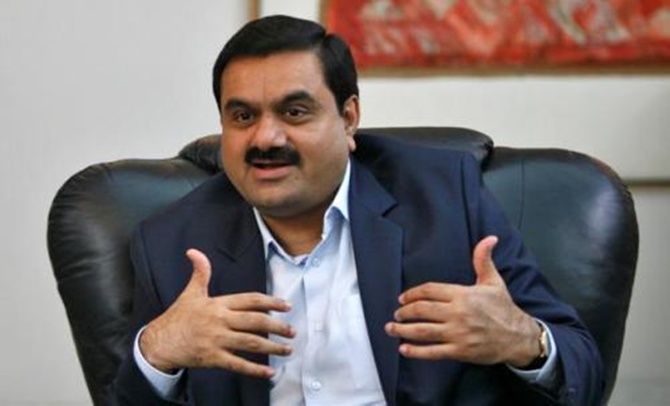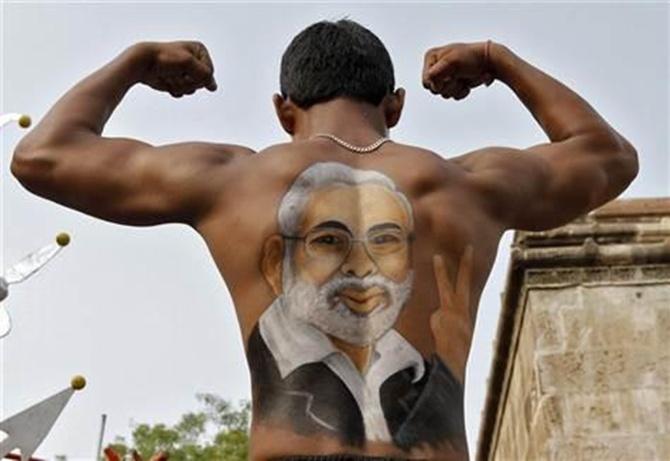 | « Back to article | Print this article |
Why India Inc admires Narendra Modi
A recent survey of 100 chief executives conducted by Nielsen for The Economic Times said 80 per cent want Modi to become prime minister. Unfortunately for Modi, their numbers are too insignificant to influence the elections.
When Narendra Damodardas Modi was anointed the Bharatiya Janata Party’s, or BJP’s, prime-ministerial candidate for the 2014 general elections, it didn’t surprise many.
The resistance put up by Lal Krishna Advani was too feeble to halt the Modi juggernaut. If businessmen had their way, Modi, 63, would have become prime minister long time back.
Telecom czar Sunil Mittal had found him fit for the job way back in January 2009: “He is running a state and can also run the nation.”
In January this year, Anil Ambani had called Modi “lord of men, leader amongst leaders and king amongst kings”, while Anand Mahindra has prophesied the day is not far when “people will talk about the Gujarat model of growth in China”.
Even before he became the chief minister of Gujarat in 2001, Dhirubhai Ambani had said of Modi after meeting him: “Lambi race no ghodo chhe (He will go a long way).”
Click NEXT to read more...
Why India Inc admires Narendra Modi
A recent survey of 100 chief executives conducted by Nielsen for The Economic Times said 80 per cent want Modi to become prime minister. Unfortunately for Modi, their numbers are too insignificant to influence the elections.
The battle for New Delhi will be fought far away from air-conditioned boardrooms, in the dust and heat of Indian villages. But one thing is certain: Modi has businessmen dancing to his tune.
Not for nothing did Manish Tewari, minister for information and broadcasting, say in January this year: “In the 1930s, the German corporate sector had a similar fascination with a gentleman who was at the helm of affairs there.”
It wasn’t like this in the beginning. The anti-Muslim riots of February and March 2002 in Gujarat had left the nation aghast. Like all others, business leaders gave vent to their anger.
Click NEXT to read more...
Why India Inc admires Narendra Modi
Deepak Parekh said India’s image as a secular country was damaged. NR Narayana Murthy and Azim Premji condemned the violence.
At a Confederation of Indian Industry, or CII, event in April that year, Anu Aga (of Thermax) received a standing ovation when she gave an impassioned speech on Gujarat. The accusation was that Modi did little to stop the rioteers.
One way Modi could improve his image was by wooing businessmen — practical people who don’t carry an ideological baggage.
Nilanjan Mukhopadhya, the author of Narendra Modi: The Man, the Times, says that a poll showed that people were keen to move on. “That’s where he got his clue,” says he.
In February 2003, CII held a session at New Delhi for its members to interact with Modi.
Click NEXT to read more...
Why India Inc admires Narendra Modi
On the stage with Modi were Rahul Bajaj, Jamshyd Godrej and Tarun Das (then director-general of CII). The businessmen were unrelenting and Modi was incensed. A CII functionary who was closely involved with the event says the speakers chosen for the day (read Bajaj) were men who couldn’t have been controlled.
According to an account published in The Caravan last year, almost 100 CII members from Gujarat threatened to quit over the incident.
A handful of Gujarat businessmen known to be close to Modi — Gautam Adani, Karsan Patel (Nirma) and Anil Bakeri (Bakeri Engineers) — set up a rival organisation called the Resurgent Group of Gujarat. And in Delhi, CII saw its access to the BJP-led government curtailed.
This was blunting CII’s edge in its core business of lobbying. When Das approached Arun Jaitley, then law minister, he agreed to broker peace — but CII would have to formally apologise. The letter was sent.
Click NEXT to read more...
Why India Inc admires Narendra Modi
The next year, Modi agreed to attend another CII function in Delhi. All went well till a glitch was discovered: the television channels were playing tapes of last year’s acrimonious meeting. “Modi was livid,” recalls the man who had to bear the full brunt of his verbal volley.
The turning point came in October 2008. Tata Motors’ factory to make the Nano at Singur in West Bengal had run into Mamata Banerjee.
Exasperated, Ratan Tata, who was steering the group at that time, had said that he was prepared to relocate the factory. It was a prestigious project; many chief ministers activated their bureaucrats to grab it: Uttarakhand, Maharashtra and Karnataka.
The race was won by Modi who moved with Usain Bolt-like speed. The site chosen was Sanand, near Ahmedabad.
Click NEXT to read more...
Why India Inc admires Narendra Modi
Kevin and Jackie Freiberg, in their book Nanovation, say the memorandum of understanding for the factory was inked within 96 hours of Tata’s announcement to quit Singur.
Tata would later remark: “Usually, a state takes 90 to 180 days for land and other clearances. Gujarat took just three days. It has never happened before.”
He then called Modi the “good M” and his Singur tormentor the “bad M”.
Modi’s detractors and Tata Motors’ rivals insist that Gujarat gave tax sops worth thousands of crores to get the project.
A Gujarat government officer discloses that apart from waiving off the stamp duty and registration charges, Tata Motors was granted VAT refund for 20 years (linked to investment). This was done, he says, because Modi knew “it would catapult the state as an investor-friendly destination.”
The rest was easy. Since then, other automobile companies like Ford and Maruti Suzuki have announced sizeable investments in Gujarat. Tata began to attend the Vibrant Gujarat summits, the biennial mela organised by Modi for investors.
Click NEXT to read more...
Why India Inc admires Narendra Modi
During the one in January 2009, immediately after the Nano deal was settled, said one report, “Tata drenched the (Gujarat) chief minister in praise”. And by the time Tata finished his speech, he “found himself locked in a hug with Modi who strode across the podium with open arms”.
It is worth noting that Tata’s successor, Cyrus Mistry, chose to make his first public appearance at the Vibrant Gujarat summit held in January this year at Ahmedabad.
What endears Modi to businessmen is that he says what they want to hear: private investment in the railways, throwing open the defence sector, et cetera. “He is pro-market, pro-business and supports reforms,” says Ajit Gulabchand of Hindustan Construction Company.
Anti-reform steps like Modi’s stand against foreign direct investment in multi-brand retail are dismissed as political exigencies.
He is seen as decisive, though divisive and authoritarian — the exact opposite of Prime Minister Manmohan Singh. When asked in an interview if he was a dictator, Modi said: “Imposition will never get you the results. Inspiration will always give you the results.”
Click NEXT to read more...
Why India Inc admires Narendra Modi
What everybody agrees on is that Modi gets things done. “Once a project is cleared by his office,” says the CEO of a large corporation, “one doesn’t face any problem from the bureaucracy, police or local politicians.”
Another recalls how Modi personally made telephone calls when he complained about his stuck project in Saurashtra.
“The matter was sorted out immediately,” says he. “You don’t need to have chai with the bureaucrats to get the work done,” says the owner of a mid-sized Gujarat-based pharmaceutical company. In return, businessmen don’t mind the demands Modi makes.
When Onkar Kanwar of Apollo Tyres met Modi to set up a unit in Gujarat, the chief minister said that he would have to distribute rubber saplings amongst the tribes, and their produce must be used in the factory.
Modi makes it a point to return the call of large businessmen within 24 hours. For urgent calls, the response comes within three hours. If something cannot be done, Modi will say so without beating around the bush.
“You know where you stand and you don’t have to follow up persistently; he always comes back with an answer,” says the Mumbai-based owner of a large business. Unlike other chief ministers who don’t feel confident in meetings unless they are surrounded by half-a-dozen bureaucrats, Modi is game for one-on-one talks.
Click NEXT to read more...
Why India Inc admires Narendra Modi
“The interesting thing about Modi is that if he says something can’t be done, you can’t get even (senior) BJP (leaders) or RSS (Rashtriya Swayamsevak Sangh, the ideological parent of BJP) to get it done. This is unlike the Congress where, if a minister refuses to do some work, you can always go to 10, Janpath (the residence of Sonia Gandhi) or Ahmed Patel (her political secretary),” adds another businessman.
During Vibrant Gujarat, senior bureaucrats are attached to top businessmen to act like their protocol officers. Modi personally invites the business leaders. “There is no question of refusing,” says a regular at the summits. “If you have an overseas trip planned, he will ask you to drop it.”
Another businessman says that three days before the summit, he calls the key speakers to know what they will say; if there is something he doesn’t approve of, he will ask it to be changed. He often lands up at the venue past midnight to check the bandobast.
In spite of his organisation skills, which Modi told Mukhopadhyay he learnt during his RSS days, some businessmen are skeptical if he will be able to do much in New Delhi - if he is elected.
One, the issues at the centre will be different from a state. Two, Modi will be hobbled by coalition dharma - all indications are that BJP on its own will fall way short of majority in the Lok Sabha. “Modi’s approach seems to be working in Gujarat,” The Economist said in January this year, “but such an autocratic style would be difficult to apply at the national level, especially in an era of coalition government.”
Many businessmen will also tell you privately that Modi has his own set of favourites. He is perceived to be particularly close to Adani.
Click NEXT to read more...
Why India Inc admires Narendra Modi
It could be coincidence, but Adani has grown phenomenally ever since Modi came to power: from a turnover of Rs 3,300 crore (Rs 33 billion) in 2000 to Rs 47,000 crore now (Rs 470 billion).
Adani has sponsored, apart from the Vibrant Gujarat summits, even kite and navaratra festivals organised by the state. And when Wharton dropped Modi as the keynote speaker at the Wharton India Economic Forum some months ago, Adani promptly withdrew his platinum sponsorship of the event.
Modi attended the wedding of Adani’s son, Karan, in Goa as well as the reception that followed in Ahmedabad. Adani had said in June that he had received “positive support” from various states, not just Gujarat, though he lauded the “positive and clear policy framework provided by the Gujarat government.”
It’s because of his closeness to Modi, goes the buzz in Mumbai’s business circles, that Adani has been fined Rs 200 crore by the environment ministry in New Delhi. And Mukesh Ambani’s gas fields in the Krishna-Godavari basin are subject to intense scrutiny because all his new investments — worth $24 billion — are going into Gujarat.
Mukesh Ambani is a regular at all Vibrant Gujarat summits. Modi, for the record, hasn’t commented on the higher price for Reliance Industries’ gas from the Krishna-Godavari basin or the falling output from the fields
Things have taken a U-turn for Modi since the disastrous CII meeting more than 10 years ago. Some months ago, a Kolkata businessman went to meet Modi with a donation of Rs 3 crore, to be paid by cheque.
As he was leaving, Modi said: “If you are giving it as a donation, then it is fine. But if you think this is an investment, then please don’t give.”
Clearly, he calls the shots now.
(Vinay Umarji and Rutam Vora contributed to this report.)
